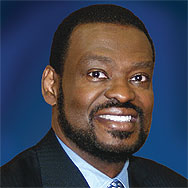
bickering and pettiness displayed by our legislators, political
pundits and candidates for office. I have longed for representatives
who are informed and articulate, who habitually seek the best laws
and results for the land. Unfortunately, the history I have reviewed
recently suggests that we may be more like our forefathers than we
would like to believe.
Those who long nostalgically for more civil times should not read
some of the pamphlets distributed during the election of 1800 when
Jefferson defeated Adams! Neither should they watch the movie
Conspiracy, which discusses the way Washingtonians accused of
working with John Wilkes Booth were unfairly stripped of their rights
and executed. Although the political process was fraught with danger
and contention, there were also many leaders who paid a real price
for their convictions.
For example, Dr. Martin Luther King Jr. has loomed larger than
life in the hearts and minds of Americans since his assassination in
1968. The massive monument which now stands on the National Mall in
Washington, D.C., is a physical manifestation of the spiritual giant
he has been to so many of us over the past two generations. Today’s
leaders can only hope to capture a fraction of the respect from his
followers and fear from his opponents that Dr. King commanded during
his lifetime. Yet this was never the life that he sought for himself.
Indeed, if there is one lesson we can learn from this man today, it
is that the best leaders are often reluctant to bear the burden of
leadership, because they understand the cost is so high.
Those who have studied Dr.
King’s life know that he came to a crossroads in his life in
Montgomery, Ala., in 1956, after two years of pastoring Dexter Avenue
Baptist Church. Before accepting that position, he had intended to
pursue a quiet academic career filled with teaching, studying and
writing. After moving to Alabama he was made head of the pastors’
association that led the famous bus boycotts and found that he and
his family were facing growing harassment by local police.
One day in 1956 he stopped what he was doing and prayed at his
kitchen table, asking the Lord whether such activism was worth the
risk to himself and his family. These are the words he heard in
response: “Stand up for righteousness. Stand up for justice. Stand
up for truth. And lo, I will be with you. Even until the end of the
world.”
All of the events that followed in Dr. King’s life—the ones
that we remember—reflected his obedience to these words. How many
of our political and community leaders today can say honestly that
such obedience has been the driving force of their careers?
Those who worked with Dr. King on a daily basis remember more than
the fiery speeches that captured a nation’s attention and stirred
its moral conscience. They remember a soft-spoken, thoughtful man who
was keenly focused on the task at hand. They remember a man who
worked late into the night and rose early; someone who came across as
genuine and accessible to the people around him. Dr. King didn’t
seek the spotlight as so many would-be celebrities do today; he was
thrust into the spotlight by the demands of his times. He didn’t
hunger for attention, but he used the attention directed at him to
further the cause he fought for—not his career.
Think about King’s quality of leadership in light of the petty
politics we observe today, where members of both parties are willing
to sacrifice principles and progress to score cheap points with the
special interest groups. While we can’t know for certain what King
would have said about the economy, healthcare, taxes or Social
Security, we can be confident he would not have switched positions on
these issues for opportunistic reasons. He would likely have had some
choice words for the numerous elected officials caught in ethics and
corruption scandals over the past months and years as well.
With today’s emphasis on political correctness, it is easy to
forget how often Dr. King spoke of “moral law,” “natural law,”
or even “God’s law” in his writings and speeches. Would such a
man have embraced the current wholesale removal of God from the
public square by secularist totalitarians? I think not. Dr. King was
radically different from leaders in either party today. He was
committed to making things happen. His ideology was not self-centered
or self-serving.
It is difficult for us to remember the raw physical courage it
took during that era; members of the movement were not only being
arrested and thrown in jail, but murdered on a regular basis. Most of
us remember Medgar Evers and Dr. King, but how many remember Ben
Chester White, Wharlest Jackson or Oneal Moore? We must pray that God
will raise up a new generation of leaders who will have as much
intellectual courage as our ancestors. We need innovators,
businessmen and problem solvers who will be willing to give their
lives to the cause of restoring America to everything God has called
it to be.
Bishop Harry R. Jackson Jr. is the senior pastor of Hope Christian Church, a 3,000-member congregation in the
Washington, D.C., area. He is also the guest editor of the January-February 2012 issue of Ministry Today about social transformation.







Leave a Comment
You must be logged in to post a comment.